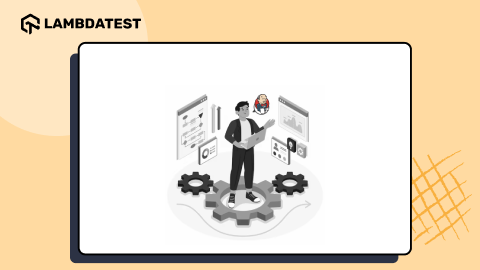Getting Started With DevOps – A Beginner’s Guide
Chandrika Deb
Posted On: June 29, 2022
![]() 186741 Views
186741 Views
![]() 21 Min Read
21 Min Read
Are you looking to get started with DevOps or willing to shift gears in your professional career by adding DevOps as a skill? If your answer is yes, you have arrived at the right place!
From startups to multinational businesses, every niche of the technology industry is changing its software development methods. DevOps tools and practices amazingly reduce the operational gap between the development and the operations team, thus the name “Dev-Ops”. It enhances productivity and quality, enables faster deployments, and results in risk-free production processes.
The DevOps market reached USD 5 billion in 2017 and is anticipated to grow at a CAGR of 19.04% from 2018 to 2027, reaching USD 14.5 billion in 2027.

When I started my career as a software developer, I often used to think about the need to have green builds for pushing a single line of code. But, with time, I realized the importance of having green pipelines and overall the value of DevOps culture. In layman’s language, one can say, “DevOps is the go-to solution in case you want to work collaboratively without any hustle!”
Read this blog on getting started with DevOps to explore all the aspects of your DevOps journey from scratch. Even if you get your hands dirty with DevOps tools every day, you might want to read this DevOps tutorial to acquaint yourself with the latest tools and practices.
TABLE OF CONTENTS
- What is DevOps?
- The Contrast: Before DevOps vs After DevOps
- Getting started with DevOps from Scratch
- Continuous Integration & Continuous Deployment
- Know-How of Monitoring Tools
- Possessing Foundational Cloud Knowledge
- Key Factors to consider before Getting Started with DevOps
- Best Practices of a DevOps Champion
- Frequently Asked Questions (FAQs)
What is DevOps?
DevOps is a culture that acts as an enabler of agility. It bridges the gap between the developers and the maintainers by implementing practices of collective responsibility. Traditionally, these teams had a barrier between them, and software packages were metaphorically thrown past the wall. But, with DevOps processes, that barrier is no longer in existence.
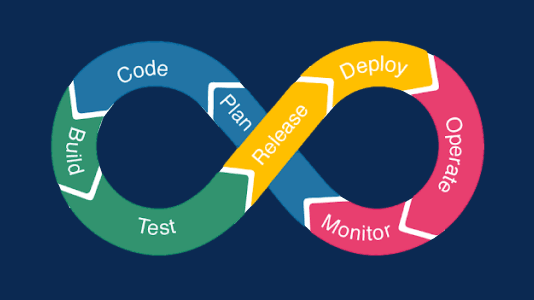
Collaboration is one of the guiding pillars of DevOps, which eventually results in faster deployments. In DevOps culture, teams come together and share responsibilities of streamlined builds catalyzed by continuous deployments, automation, and production infrastructure. A cross-functional team improves engagement and communication over traditional silos of perpetual disagreement and time-consuming ticketing processes.
Nowadays, the term DevSecOps is also a buzzword. This flavor of DevOps culture involves maintaining the security compliance of the software right from the project initiation phase till its delivery.
However, in this blog on getting started with DevOps, we will only deal with “DevOps” and explore how to get started with it.
The Contrast: Before DevOps vs After DevOps
Before DevOps came into the picture, software companies followed the traditional ‘Waterfall’ model that worked well for many projects like CRM, inventory management, etc. Yet it has its own set of drawbacks. However, when DevOps came into the picture, it completely changed the software development concept.
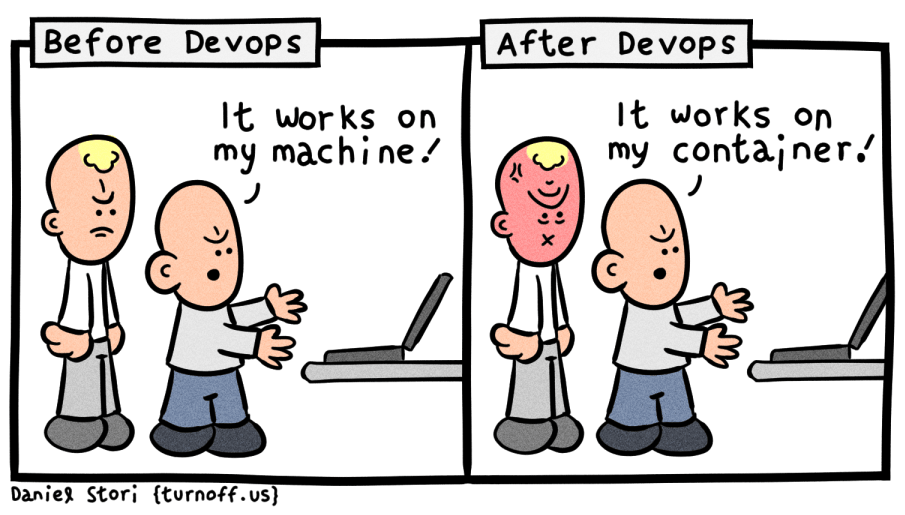
This short comparison is enough to let you know why the ‘Waterfall model’ is the thing of the past and why ‘DevOps culture’ is the way forward:
| Waterfall approach for product delivery | Continuous Software Delivery |
| Slow launches | Faster feature shipments |
| Higher downtimes | Faster resolution times |
| Low productivity due to less transparency | Enhances team productivity |
| No scope of having green environments | Stable Dev and Prod environments |
| Difficult to manage and less flexible | Efficient management |
| Lack of documentation due to less collaboration between teams | Common documentation – Dev and Ops team |
| Less accountability | Higher rate of satisfaction |
| Lack of team coordination | Improved collaboration |
| Less efficient engagement | Higher rate of communication |
| Less room for improvement | Improved Quality |
| Haphazard code merge | Speedy execution |
DevOps practices have enhanced the collaboration between Development and Operations teams. This collaboration helped in continuous business planning. This collaboration was one of the missing pieces in the ‘Before DevOps’ era, and I have witnessed both eras! 🙂
DevOps Practices (Thread)
To build effective #DevOps culture, best practices need to be followed. pic.twitter.com/q1PTbVmEFY
— Ankit Mehta 🇮🇳🇹🇭 (@ankyitm) June 17, 2022
DevOps culture has excelled at cutting short and redefining the complex SDLC processes. DevOps helps keep everyone connected to the process so each team member can be more involved in the success of the software deployment.
Getting started with DevOps from Scratch
The journey of DevOps is quite a long one! For an entry-level DevOps Engineer role, you need to equip yourself with some basic concepts of programming and network or cloud infrastructure.
DevOps Roadmap
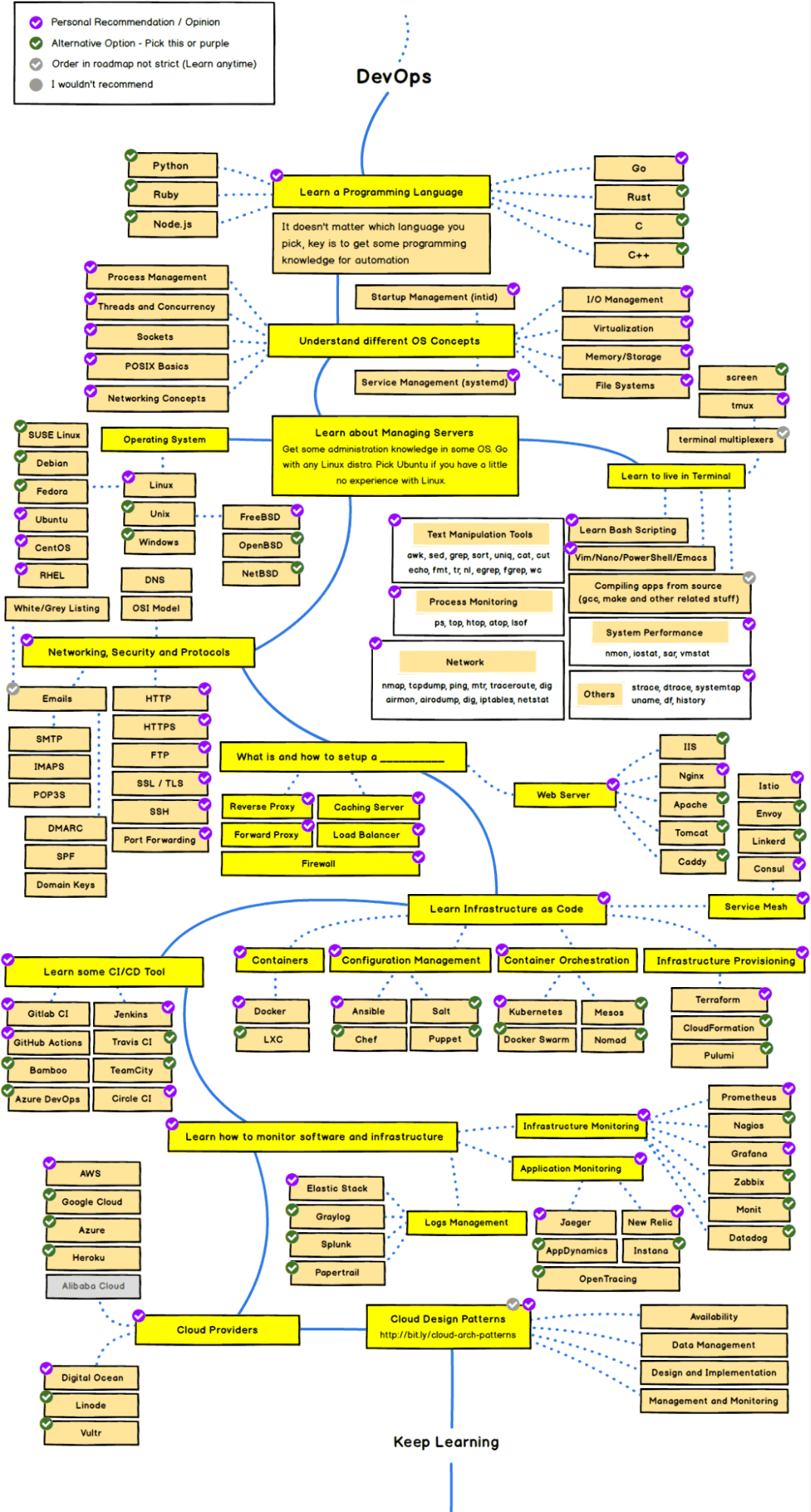
Don’t be overwhelmed with this complicated roadmap. Below I have curated a brief step-by-step guide for getting started with DevOps.
Strengthening the Foundational Knowledge
It is essential to know the right tools, practices, and concepts for the DevOps team. As per my experience, it is good if the team members know the nuances of the Software Development Life Cycle (SDLC).
Below mentioned are a few of the common roles and responsibilities of a DevOps engineer.
- Planning of the Project
- Development and Deployment within deadlines
- Quality Assurance along with proper Testing
- Security Compliance and Automation
- Effective collaboration with developers, IT, admins, etc.
- Software Maintenance, Troubleshooting, etc.
Choosing a Programming Language
It is mandatory to learn a programming language as the first step in your DevOps journey. The popular back-end languages to start your DevOps journey are Python, Ruby, JavaScript, Go, Java, etc.
If you are a novice in the programming field, you can begin with Java or Python. Many cloud providers like Azure, AWS, Google Cloud, etc., have compatible SDKs for these languages. It enables the integration of codebases, lets you debug services/microservices, or automating processes & deployments.
Keeping up with all the changes in the technology industry is an enormous challenge, and organizations, therefore, need to automate repetitive testing processes to ensure that software performs according to expectations and provides value in no time. That’s where a cloud-based automation testing platform like LambdaTest comes to the rescue!
Using LambdaTest, you can perform manual and automated cross browser testing at scale over an online device farm of 3000+ real devices and operating systems. Automation testing tools like LambdaTest allow you to harness the power of cloud-based online Selenium Grids in conjunction with our local grid setups.
Automation testing frameworks like Selenium, Cypress, and Playwright can be run in a Continuous Integration pipeline on the LambdaTest Grid.
The concepts of scalability, modularity, and efficiency are the key areas to focus on as a DevOps engineer when selecting a programming language.
Understanding Fundamentals of Operating Systems
An operating system (OS) is defined as an interface between the user and the hardware. It is essential to learn a bit about OS concepts as you will work with servers and applications. Hence, it is crucial to know for which OS you will write the code.
Kernel and memory management, threading, concurrency, sockets, POSIX basics, file and I/O management, virtualization, etc., are some of the important OS concepts. Understanding these OS concepts gives you an edge over others as a DevOps engineer in terms of memory and disk usage, optimization, allocation of resources, processes, etc.
At present, Linux is the most used OS in the IT industry. Other examples of OS are Windows, Ubuntu, Fedora, Unix, CentOS, etc. In Fact, as per Statista, the most popular technology skill in the DevOps tech stack in 2021 was Linux, chosen by nearly half of the respondents.
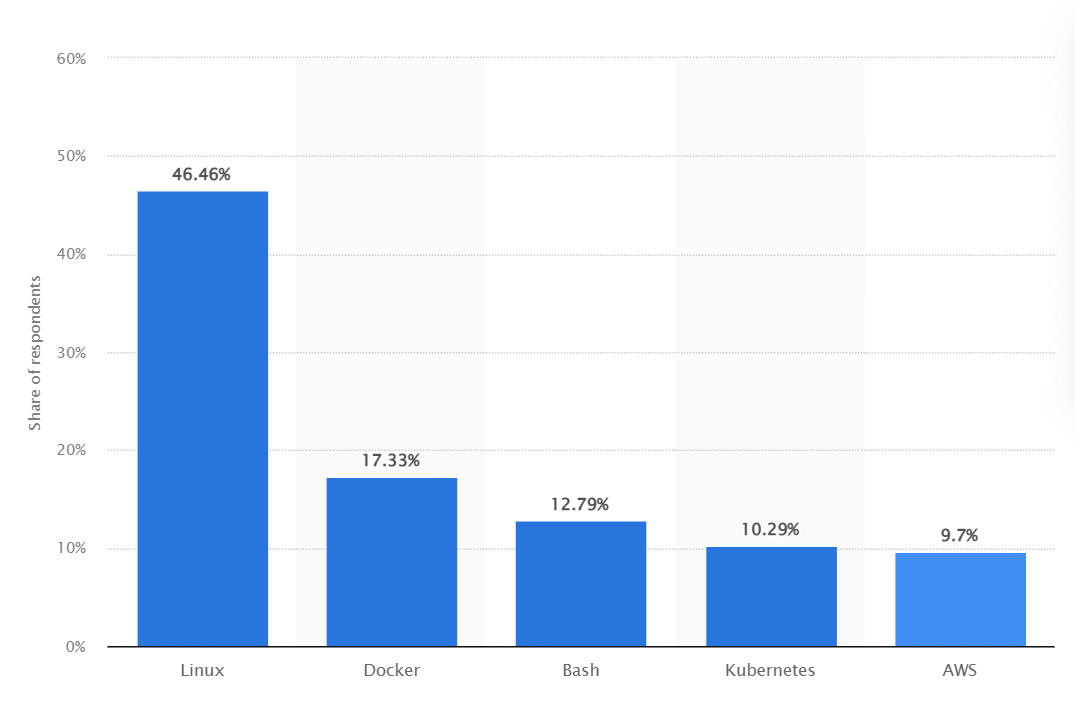
Knowing Basics of Terminal and Shell Scripting
Getting comfortable with terminal commands is a prerequisite to being a DevOps engineer. Practicing these commands daily for process monitoring and manipulation of system performance polishes your scripting skills.
Terminal lets you accomplish different tasks without the use of a Graphical User Interface (GUI). It is also known as console or command line.
Below are some of the basic shell scripting functions to learn to get started with DevOps:
- Text Manipulation
- Compilation
- Bash or Shell Scripting
- System Performance
- Powershell/VIM, etc.
Understanding Networking Concepts
When running an interconnected system of servers, apps, and resources on a network, it is crucial to learn about the networking and security concepts to diagnose any troubleshooting issues or network issues.
A few of the networking concepts that you must get familiar with are stated below:
- TCP/IP network protocols
- HTTP and HTTPS
- SMTP and FTP
- SSL/TLS
- Network Forwarding
- Firewall and Proxy
Understanding networking allows you to create an environment where you can test your functions and put continuous integration and delivery pipelines in place. Let’s explore the continuous integration and deployment concept in the next section of this article on getting started with DevOps.
Accelerate the delivery pipeline with your favorite CI/CD tools. Try LambdaTest Now!
Continuous Integration & Continuous Deployment
The main keywords associated with DevOps are Continuous Integration (CI) and Continuous Deployment (CD). It is a norm to implement these practices to adopt the DevOps culture. Without these, DevOps is incomplete!
As per Statista, 62% of organizations at a more advanced stage of their DevOps evolution have adopted Continuous Integration and Continuous Delivery (CI/CD) to meet organizational needs while they continue to adopt self-service capabilities.
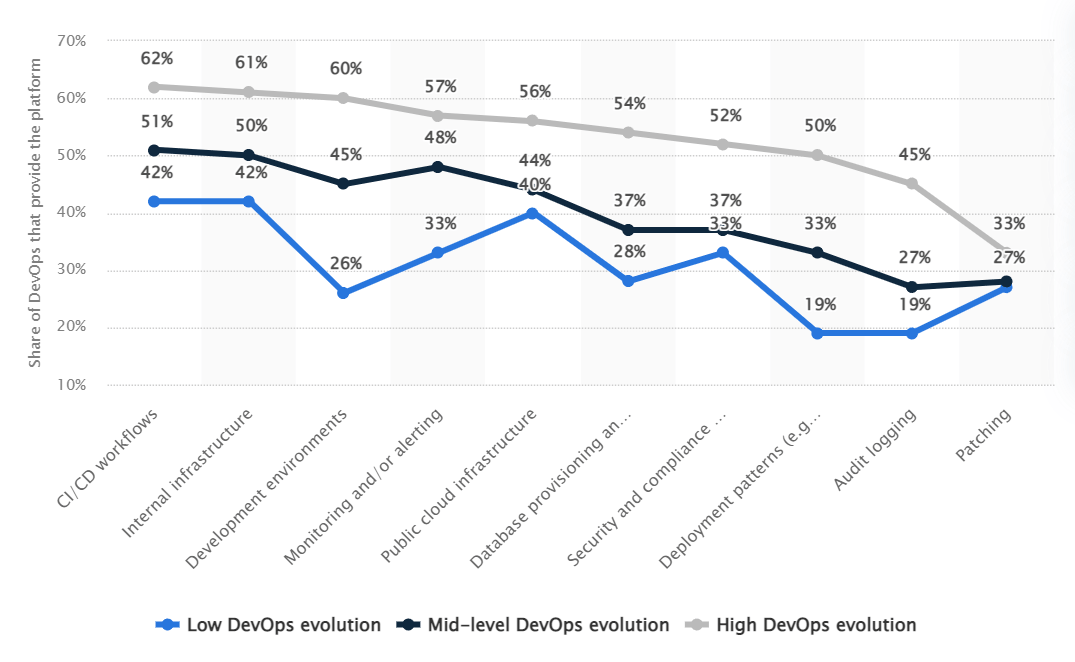
This aspect of DevOps helps to make frequent stable deliveries while maintaining the code quality. A Continuous Integration pipeline often runs on the feature and master branches of a code repository. It ensures that your bits of code produce no error when integrated into the shared master repository.
A Continuous Deployment pipeline runs automation tests on the code for a particular release scope. This helps with reducing costs, accelerates delivery timelines, and reduces effort. It also helps to enhance the overall efficiency and team productivity.
The value of Continuous Testing to any DevOps pipeline is incalculable. As much as this is true, it’s also the case that a Continuous testing strategy is the foundation of an effective pipeline.
You can also Subscribe to the LambdaTest YouTube Channel and stay updated with the latest tutorials around Selenium testing, Cypress E2E testing, CI/CD, and more.
Some commonly used best CI/CD tools are Jenkins, GitHub, Bamboo, Ansible, TravisCI, CircleCI, Teamcity, Google Cloud, etc.
Know-How of Monitoring Tools
Having an understanding of Infrastructure and application monitoring is one of the key requirements for stepping into the world of DevOps. Collecting data from servers, network devices, and other services helps you monitor basic metrics such as disk space, throughput, latency, etc. This help finds room for improvement, defect resolution, and health monitoring.
Application monitoring tools help improve efficiency and fix bugs in the apps before users perform some functions. As it is necessary to act upon and send feedback immediately whenever there is any issue, DevOps teams should be proactive and have robust monitoring techniques.
Example tools for infrastructure monitoring are Prometheus, Grafana, Datadog, Nagios, Splunk, etc. For application monitoring, some example tools are AppDynamics, New Relic, Sumo Logic, etc.
Possessing Foundational Cloud Knowledge
As a beginner DevOps engineer, you need a basic understanding of the cloud. According to Statista, when it comes to cloud computing market share, AWS remains in the first place with a 33% share, followed by Microsoft Azure with 21%. Google Cloud is slowly catching up with a 10% share, which is already impressive because it was launched just a few years ago. For getting started with DevOps, you need to understand the backing services, advantages, product requirements, and providers related to Cloud technology in your organization.
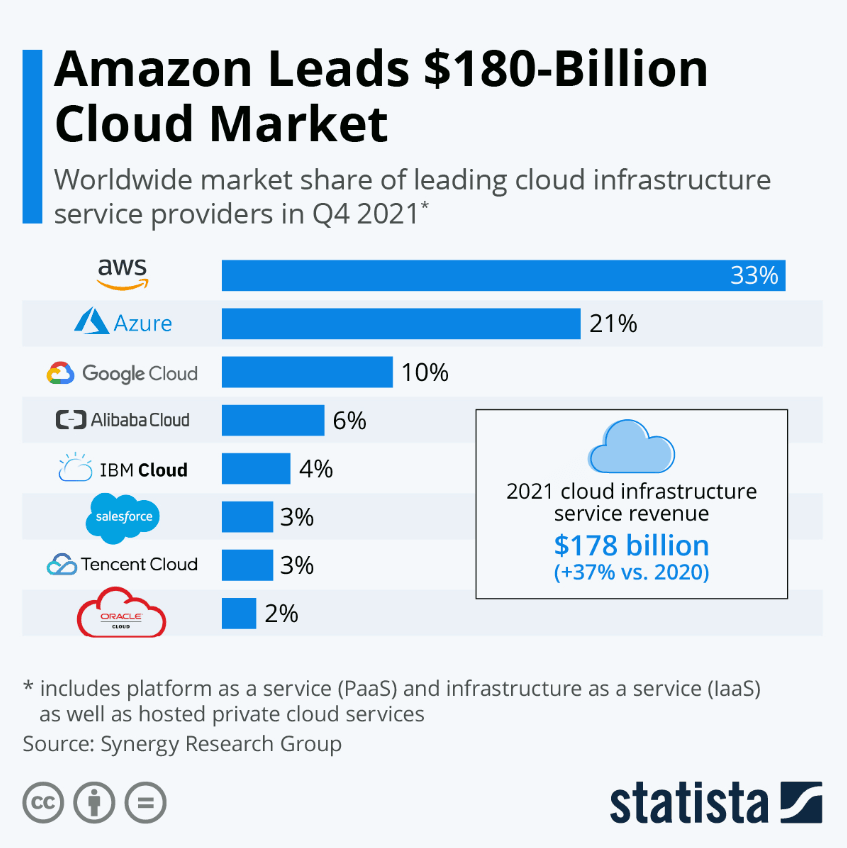
There are several popular Cloud providers like Microsoft Azure, Google Cloud, Amazon AWS, Digital Ocean, etc. These providers have the options of different pricing packages depending on the services offered, memory, CPU requirements, security compliances, etc.
Cloud technologies provide better flexibility, dynamic configurations, controlling web servers and databases, etc. Cloud deployment ensures that you need not rewrite configuration files, and scaling up and down the servers takes place dynamically. Softwares like Nginx can help you manage your servers more efficiently.
Furthermore, several relevant standardized DevOps certifications are available online to help kick off your career as a DevOps Engineer. DevOps Certifications not only enhance your knowledge but also validates your skills in a particular domain that is beneficial for moving ahead in your career graph.
Key Factors to consider before Getting Started with DevOps
The demand for DevOps is always at an all-time high in the IT industry. Hence, it is necessary to understand what DevOps is and, more importantly, what it is not. Organizations often struggle to implement collaboration, agility, and orchestration in their attempt for DevOps evolution.
Therefore, to utilize the metrics-based results that DevOps tools and technologies offer, the organization must be willing to adopt a few incremental changes as mentioned below over the years.
Technological Automation
Learning about automation is an important part of DevOps. The ability to automate hefty processes of managing servers and deployments is something that recruiters look for in an ideal DevOps candidate.
Automation certifications and courses may help to understand the details of automating processes. The approach should be to automate anything you perform manually more than two times. The CI/CD best practices and everything-as-code helps you and your organization adopt the DevOps culture better. You can learn more about it by going through these articles on the importance of automation testing in DevOps and the role of automation testing in the CI/CD pipeline. In a nutshell, automating testing is a backbone for DevOps. Another aspect that can be optimized is database management. With the implementation of DevOps practices and tools like Liquibase, database management tasks can be automated, leading to more efficient development processes.
Processes and Practices
The main purpose of DevOps is to regularly deliver small incremental value products or services to the customer. To achieve this feat, one must comply with the chief practices of DevOps – Continuous Integration (CI) and Continuous Deployment (CD). These small units of incremental delivery are also operationally supported in the production phase.
Shift to DevOps Culture
DevOps is not simply a project that has a definite deadline. Instead, DevOps is a culture that comes with major organizational and technological changes. DevOps teams break down silos by having cross-functional teams and reducing hand-offs, handovers, ticket queuing systems, and dependency mapping. DevOps is a movement or culture shift in application or software development.
The goal of DevOps is to make everyone accountable and work together with full responsibility to break silos or resolve bottlenecks in the whole process and not just the developers.
Inspect, Adapt, & Learn!
DevOps culture gets driven by the motivation to improve continuously. Retrospective meetings help companies to inspect the setbacks and bottlenecks. “Lessons Learned” meetings help to adapt to the continuous delivery pattern in organizations with DevOps culture in practice. And, knowledge sharing week lets the team learn from each other.
A few certifications like Azure or AWS can help you a lot in climbing up the DevOps ladder. To get started, below are a few accredited certifications that one can complete to begin their DevOps job hunt!
- Docker Certified Associate
- Certified Kubernetes Application Developer
- AWS Certified DevOps Engineer
- Azure DevOps Solution Expert
- Udacity Cloud DevOps Nanodegree
Perform reliable automated testing across 3000+ browser environments. Try LambdaTest Now!
Best Practices of a DevOps Champion
While the organization should adopt the DevOps culture and practices and be collaborative, everyone in the team need not be an expert in the DevOps technologies. Companies such as Google, Amazon, Microsoft, Salesforce, RedHat, etc., are constantly hunting for experienced or senior DevOps engineers, often known as DevOps Champions, who would drive the team’s success by implementing DevOps in the correct order!
However, DevOps adoption is not the responsibility of a single person in the team. Instead, it is the job of the whole organization to embrace DevOps as a culture and part of their daily work. Collaboration, communication, and cross-functional approach help you get started with the DevOps mindset of “constant improvement”. Once implemented across teams, DevOps can help you break silos and only focus on delivering value MVP (Minimal Viable Product).
As a DevOps Champion, you will serve as a technical expert on solutions and a voice and champion for users, prospects, and partners, driving feedback to engineers and product management.
Below are some of the characteristics of a DevOps Champion that are usually expected in the IT industry to help the team embrace the culture shift to DevOps.
DevOps Knowledge
DevOps is a hard path to go down, and empowering teams is a long-term process. A learning curve will certainly arise with or without a DevOps champion, but speed and clarity of goals will greatly improve with an expert champion on board. Overall, DevOps Champions should encourage developers, quality analysts, business analysts, system administrators, and many others to share a collaborative, iterative, and committed approach to their work.
Basic Everyday Responsibilities
The DevOps Champion is the person responsible for bringing in a DevOps culture. They are accountable for ensuring the success and implementation of all DevOps processes and team identity.
Daily duties of a DevOps Champion usually consist of:
- Promoting the benefits of DevOps Culture
- Ensure buy-in from both developmental and operational teams
- Determining the key roles for success
- Ensuring all team members are trained well
Other Important Practices
Once the entire team understands the culture and practices of collaboration-based work, the DevOps Champions can move on to help other areas of your organization. They can turn their focus to implementing sophisticated techniques, such as autoscaling, complex monitoring, and high availability.
Conclusion
While it may sound tempting to hire a team of DevOps experts and quickly deploy the technologies, there are no cutting corners when transitioning to DevOps. Implementing cultural change in an organization is no easy feat. But in taking the time to correctly help your team embrace the DevOps culture, one day, you may notice and realize that everyone at your organization is, in fact, a DevOps champion.
In this DevOps tutorial on getting started with DevOps, we have presented a brief overview of how to get started with the DevOps buzzword and what your responsibilities will be like as a DevOps engineer. We explored the definition of DevOps, its comparison to traditional processes, skills and certification required, etc. We also discussed the factors to consider before restructuring your organization in a cross-functional way and adopting the DevOps culture. Lastly, we took a look at who are DevOps Champions.
I hope you found this article on getting started with DevOps useful. Please do share your feedback in the comments section.
Frequently Asked Questions (FAQs)
How do I start learning DevOps?
Start by learning:
- The Culture.
- A Programming Language.
- Manage Servers.
- Networking & Security Basics.
- Scripting.
- Installing & Configuring Middlewares.
- Deploying Software.
Can a beginner learn DevOps?
In the software world, DevOps is a relatively new job role that combines development and operations skills. If you’re wondering whether you can learn DevOps as a beginner, the answer is yes! The key to success is to identify what’s important to you and how much time you have to dedicate to it.
How do you get into DevOps with no experience?
The right way to get into DevOps is to start in your existing job. You’re already a developer, so you can start learning about DevOps by figuring out what developers are doing and how they’re working with others in the organization. Are there any new services that have been developed recently? Maybe there’s a deployment system that’s just being put into place, or maybe there’s a bug tracker for logging problems with the software.
what is a devops engineer?
A DevOps engineer is a professional who merges software development (Dev) and IT operations (Ops) to enhance software delivery processes. They automate workflows, manage infrastructure, and ensure collaboration between development and operations teams for efficient and continuous software deployment.
what does a devops engineer do?
A DevOps engineer collaborates across development and operations teams, automating processes for seamless software delivery. They manage infrastructure, configure tools, implement CI/CD pipelines, monitor systems, and ensure rapid, reliable, and efficient software deployment.
how to become a devops engineer?
To become a DevOps engineer:
- Learn programming, cloud platforms, and version control.
- Master tools like Docker, Kubernetes, and CI/CD.
- Gain knowledge in monitoring, security, and scripting.
- Develop collaboration and problem-solving skills.
- Consider certifications and practical projects.
- Stay updated with industry trends and network with professionals.
Is DevOps a coding job?
Yes, DevOps involves coding. A DevOps engineer combines development, operations, and administration skills to enhance software processes. Strong technical coding and interpersonal skills are necessary as DevOps aims to improve technology and culture simultaneously.
What is DevOps engineer skill?
DevOps engineers need cloud computing proficiency. They must deploy and automate secure cloud environments for robust system availability. Acquiring skills like CompTIA Cloud+ certification can help build this expertise.
Is DevOps related to Java or Python?
DevOps is related to both Java and Python, but Python holds particular relevance. Python’s adaptability to various environments and its versatility make it a favored choice for DevOps tasks. It works well across platforms like Windows, macOS, and Linux, contributing to its popularity among DevOps teams.
Got Questions? Drop them on LambdaTest Community. Visit now








